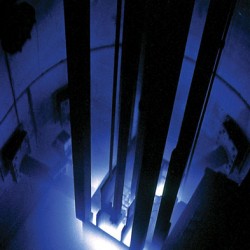Not Your Grandmother’s Miss America
Grace Stanke ’23 brings Wisconsin nice and nuclear know-how to an American tradition.
Heavy is the head that wears the crown, the graduation cap, and the hard hat — but Grace Stanke ’23 bears them all with admirable … well, grace. After winning the 2023 Miss America pageant during her senior year at UW–Madison, she took to the skies to fulfill her duties as one of America’s most time-honored celebrities.
For Stanke — whose social impact initiative “Clean Energy, Cleaner Future” promotes a transition to zero-carbon energy — this means visiting nuclear facilities, speaking to conferences of industry professionals and engineering students, and encouraging the young scientists who represent the future of the field. It also means skydiving with the U.S. Army, learning CPR from the American Heart Association, rubbing elbows with celebrity chefs, and laying the wreath at Arlington National Cemetery. But for all the time she spends in the air, Stanke has never felt more grounded.
“This experience has taught me a lot about the life I want to live, about what I want in the future,” she says.
Thanks to a title that comes with more than a tiara, this future is well within reach. According to Stanke, the true prizes of the pageant are the scholarships and the professional experience that will serve her well into her career.
“Miss America is a scholarship organization at its core,” Stanke says. “We’re creating great women for the world and preparing the world for these great women.”
What is a typical week in the life of Miss America?
I’m on a plane three out of seven days. The other four days, it can be anything from promoting my social impact initiative, to Miss America recruitment, to just representing American culture.
What have you done or tried for the first time as Miss America?
I’m terrified of lobsters. I would much rather fight a shark in the ocean than a lobster — don’t ask me why. And I went on a lobster boat with Miss Maine, because that’s what Maine is known for. I held a lobster with my bare hands — the dude was alive. I was not a fan, but I made it.
I’ve been able to go to places that I would’ve never gone to if it weren’t for Miss America, and those have been some of the most special places. One that stands out to me is North Platte, Nebraska, where I heard awesome stories about how they’re known for stopping the train that was taking World War II trainees out to their base camps, and they would feed those soldiers, which I think is just beautiful to learn about.
What has your social impact initiative, “Clean Energy, Cleaner Future,” looked like in action?
A lot of what I do is working with the public to correct misconceptions about nuclear energy: talking about what nuclear waste is, how we handle it, and the safety of nuclear energy. My second point is recruiting and getting people involved in the nuclear industry. The third point of my program is that two-thirds of our workforce in the nuclear industry is retiring in the next 20 to 30 years. That’s a huge loss of knowledge that we’ll be facing. So how can we continue to adapt workplaces so that employees want to stay there for more than five to six years? How can we make them welcoming and inclusive places? How can we develop a new generation of employees?
Do you find yourself dispelling misconceptions not only about nuclear energy, but also about Miss America?
Oh, yeah. One-hundred percent. As soon as I say I majored in nuclear engineering, that’s usually totally unexpected. People kind of do a double take. That’s a stereotype Miss America has been battling for decades, because we did start as a swimsuit competition, judging women on their looks. But it has evolved into so much more than that. It’s about women embracing who they are, women who aren’t afraid to lead, and women who are looking for a higher education.
There are days where I walk out of an event, and I’m like, “Well, that definitely wasn’t a traditional ‘Miss America’ thing that I just did.” And that really comes down to the very thing that Miss America embodies: we’re embracing women being themselves. It doesn’t matter if you’re a little bit goofy. I’m a very sarcastic, very comedic person, and sometimes when I give a speech, I’ll walk out and be like, “I don’t know if I should have made that joke,” or “That’s not something that traditionally is done within Miss America,” but maybe it’s time that tradition changes.
During your tenure, how have you grown — not as an engineer or a celebrity, but as Grace Stanke?
Being flexible is a really important skill that I’ve developed throughout college, and especially as Miss America, because quite literally, I live out of two suitcases now. Sometimes when I’m traveling, I’ve got to figure out how to do a nuclear presentation with what I have in my suitcases. I call and say, “Hey, do you have a teapot and an outlet to plug it into? Can you make a little bit of steam for me?” And then I can talk about how a nuclear power plant works with a little pinwheel that I travel with. It’s all about adaptability and being prepared for any scenario.
Besides the crown, the sash, and the pinwheel, what else is in your luggage that wasn’t there before Miss America?
I normally travel with steel-toe boots now. A lot of nuclear facilities require them. I also invested in good suitcases. I already wore through my first set. One had a full-blown hole in it, so I went to the Kentucky Derby and was duct-taping my suitcase, praying it made it back to Wausau. And it did. Barely.
Do you get weird looks from TSA when you send the crown through the baggage scanner?
No — okay, a couple of times.
Published in the Fall 2023 issue




Comments
Kathy Dood September 11, 2023
As a second generation Miss Michigan volunteer for over 30 years, I am delighted to hear from the current
Miss America and read her words. Grace has been very warm, interactive, knowledgeable and impactful.